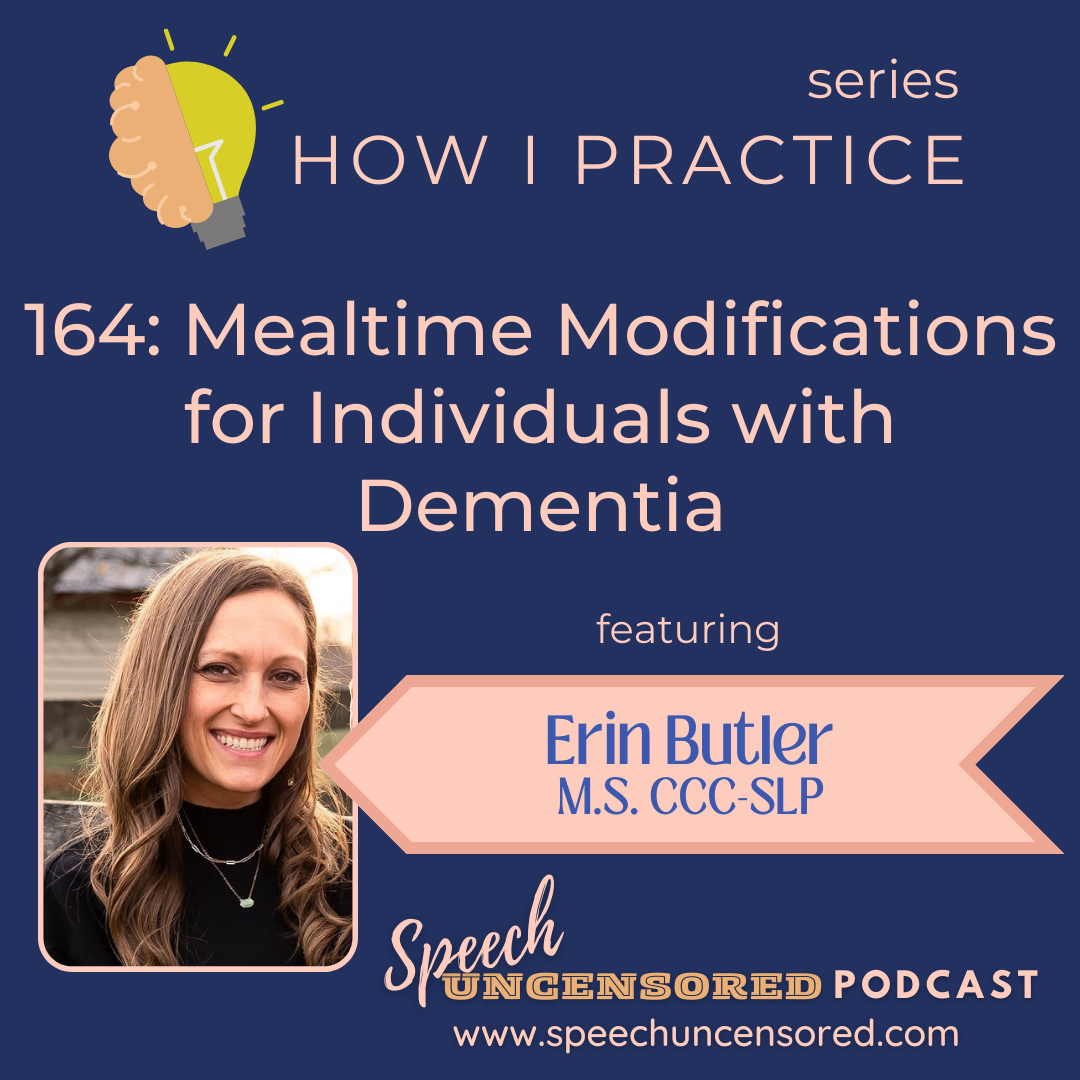164: Mealtime Modifications for Individuals with Dementia with Erin Butler, MS, CCC-SLP
Eating and drinking brings pleasure to most; however, dementia can bring about significant changes in one’s communication, cognition, sensation, appetite and ability to eat and drink. When dysphagia and dementia co-occur, speech-language pathologists play a vital role on the interdisciplinary team and should be a cornerstone in care until end of life in this population. This episodes focuses the discussion on mealtime modifications to enhance nutrition, hydration and quality of life for these individuals.
Key Takeaway:
Treat the individual, not the diagnosis!
Dementia looks different for each person, and when eating challenges present, viewing the whole picture is crucial to determine any barriers present that may be impacting their nutrition, hydration and quality of life.
Resources
Alzheimer’s Association. (2021). Food and Eating. https://www.alz.org/help-support/caregiving/daily-care/food-eating#:~:text=1%20Limit%20distractions.%20Serve%20meals%20in%20quiet%20surroundings%2C,when%20or%20if%20he%20or%20she%20ate.%20
Amella, E. J. (2002). Resistance at Mealtimes for Persons with Dementia. Journal of Nutrition Health and Aging, 6(2), 117-122. https://pubmed.ncbi.nlm.nih.gov/12166364/ American Geriatrics Society Ethics
Beck, M., Birkelund, R., Poulsen, I., & Martinsen, B. (2017). Supporting existential care with protected mealtimes: patients’ experiences of a mealtime intervention in a neurological ward. Journal of Advanced Nursing, 73(8), 1947-1957. https://pubmed.ncbi.nlm.nih.gov/28205253/
Benigas, J. E. & Bourgeois, M, (2011). Using spaced retrieval with external aids to improve use of compensatory strategies during eating for persons with dementia. American Journal of Speech Language Pathology, 25(3), 321-334. https://pubmed.ncbi.nlm.nih.gov/27538017/
Brush, J. (2018). 3 Keys to Redesigning Dementia Care So Elders and Their Caregivers Can Flourish and Thrive. From Can’t to Can Do. Brush Development Company. www.brushdevelopment.com
Brush, J. A. & Calkins, M. P. (2008). Environmental interventions and dementia. The ASHA Leader, 13(8). https://leader.pubs.asha.org/doi/10.1044/leader.FTR4.13082008.24
Chang, C. & Roberts, B. (2008). Feeding Difficulty in Older Adults with Dementia. Journal of Clinical Nursing, 17 (17), 2266-2274. https://onlinelibrary.wiley.com/doi/pdf/10.1111/j.1365-2702.2007.02275.x
Committee and Clinical Practice and Models of Care Committee. (2014). American geriatrics society feeding tubes and advanced dementia position statement. Journal of American Geriatric Society, 62(8), 1590-1593. https://pubmed.ncbi.nlm.nih.gov/25039796/
Denny, A. (1997). Quiet music: An intervention for mealtime agitation. Journal of Gerontological Nursing, 23(7), 16-23. https://link.springer.com/chapter/10.1007/978-981-16-3864-0_3?utm_medium=affiliate&utm_source=commission_junction&CJEVENT=3541d654610511ec83d975a10a82b839&utm_campaign=3_nsn6445_brand_PID100357191&utm_content=de_textlink&?utm_medium=affiliate&utm_term=PID100357191
Easterling, C. S. & Robbins, E. (2008). Dementia and dysphagia. Geriatric Nurse, 29(4), 275-285. https://reference.medscape.com/medline/abstract/18694703
Heape, A. (n.d.). Mealtime Strategies for Patients with Dementia. [Lecture notes]. HomeCEU. https://encompasscare.ceu360.com/
Kaplan, M. & Hoffman S. B. (Eds). (1998). Behaviors in Dementia: Best Practice for Successful Management. Baltimore Health Professions Press, London.
Hopper, T., Mahendra, N., Kim, E., Azuma, T., Bayles, K. A., Cleary, S. J., & Tomoeda, C. K. (2005). Evidence-based practice recommendations for working with individuals with dementia: Spaced retrieval training. Journal of Medical Speech-Language Pathology, 13(4), 27-34. https://asu.pure.elsevier.com/en/publications/evidence-based-practice-recommendations-for-working-with-individu
Jootun, D. & Mcghee, G. (2011). Effective communication with people who have dementia. Nursing standard, 25(25), 40-60. https://www.researchgate.net/publication/51028837_Effective_communication_with_people_who_have_dementia
Malone, M. (2019a). Cognitive Considerations When Assessing & Treating Swallowing with People with Dementia: Part 1: Attention. The Medical SLP Collective. https://medslpcollective.com/
Malone, M. (2019b). Cognitive Considerations When Assessing & Treating Swallowing with People with Dementia: Part 2: Learning & Memory. The Medical SLP Collective. https://medslpcollective.com/
Malone, M. (2019c). Cognitive Considerations When Assessing & Treating Swallowing with People with Dementia: Part 3: Reasoning & Executive Functioning. The Medical SLP Collective. https://medslpcollective.com/
Morley, J. E. & Thomas, D. R. (1999). Anorexia and aging: pathophysiology. Nutrition, 15, 499-503. https://www.sciencedirect.com/science/article/abs/pii/S089990079900057X?via%3Dihub
Ragneskog, H., Brane, G., Karlsson, I., & Kihlgren, M. (1996). Influence of dinner music on food intake and symptoms common in dementia. Scandinavian Journal of Caring Science, 10(1), 11-17. https://pubmed.ncbi.nlm.nih.gov/8715781/
Roddy, P. C., Liu, K., & Meiner, M. (1987). Resource requirements of nursing home patients based on time and motion studies. Rockville, MD, U. S. Dept. of Health Department of Health and Human Services, Public Health Service, National Center for Health Services Research and Health Care Technology Assessment.
Sandman, P., Norberg, A., & Adolffson. (1988). Verbal communication and behavior during meals in five institutionalized patients with Alzheimers type dementia. Journal of Advanced Nursing, 13(5), 571-8. https://onlinelibrary.wiley.com/doi/abs/10.1111/j.1365-2648.1988.tb01450.x
Schnelle, E. S. & Kayser-Jones, J. (1999). The effect of role-taking ability on caregiver-resident mealtime interaction. Applied Nursing Research, 12, 38-44. https://www.sciencedirect.com/science/article/pii/S0897189799801670
Simmons, S. & Schnelle, J. (2006). Feeding assistance needs of long-stay nursing home residents and staff time to provide care. Journal of American Geriatric Society, 54(6), 919-924. https://pubmed.ncbi.nlm.nih.gov/16776786/
Snow, T. & Porter, L. A. (Hosts). (2019, June 19). Positive approach to care for people with dementia by Teepa Snow, MS, OTR/L, FAOTA (No. 17) [Audio podcast episode]. Speech Uncensored Podcast. https://www.speechuncensored.com/podcastepisodes/s1e15-positive-approach-to-care-for-people-with-dementia-with-teepa-snow-ms-otr/l-faota
Stockdell, R. & Amella, J. (2008). The Edinbrugh Feeding Evaluation in Dementia. Determining how much help people with dementia need at mealtime. AJN, 108(8). http://www.nursingcenter.com
Tristani, M (2016). Dysphagia in Persons with Dementia: The Dual Diagnosis Challenge. Perspectives of the ASHA Special Interest Groups. SIG 15, 1(3). https://pubs.asha.org/doi/10.1044/persp1.SIG15.105
World Health Organization. (2021). Dementia. https://www.who.int/news-room/fact-sheets/detail/dementia
Contact information:
erin.butler@ec-rehab.com (work)
erinschroeder12@gmail.com (personal)
Thanks for these great resources, Erin!
Erin Butler, M.S., CCC-SLP
Guest Speaker Bio:
Erin Butler, M.S., CCC-SLP is a Speech-Language Pathologist who earned her master of science from Bowling Green State University (Ohio) in 2012. Erin has nearly 12 years of clinical experience as a medical SLP working with the adult/geriatric population primarily in the skilled nursing and long-term care settings. In the last year, Erin transitioned to home health. Her main areas of interest include assessment and treatment of both dysphagia and dementia while looking at the “big picture” to determine how to best help her patients.
Leigh Ann Porter, MA, CCC-SLP
Host Bio:
Leigh Ann Porter is a medical SLP in San Jose, California. Building on a passion for education and implementing best practice approaches, Leigh Ann created the Speech Uncensored Podcast to connect medical SLPs with meaningful resources, emerging research, and practical tools. Leigh Ann’s goal is to empower and connect SLPs to enhance our profession and accelerate the research to practice pipeline. One of her passions is learning and sharing simple and impactful therapy techniques. In addition to nerding out on medical speech pathology, Leigh Ann loves hiking at national parks, exploring waterways on her stand up paddle board, and enjoying a delicious meal with friends and family.
REVIEW the podcast
You’ll earn my undying gratitude by leaving a review on Apple Podcasts! Reviews help other SLPs find the podcast. Also, I love reading your feedback! Just click here to review, select “Ratings and Reviews” and “Write a Review,” and let me know your favorite part of the podcast. Malaho plenty!













